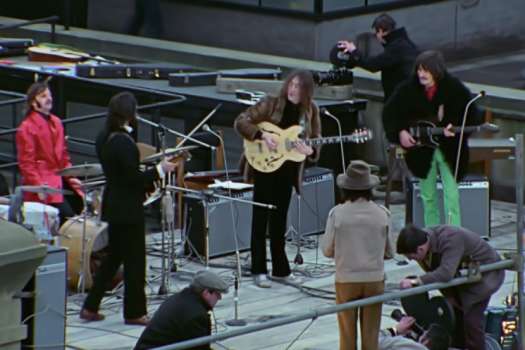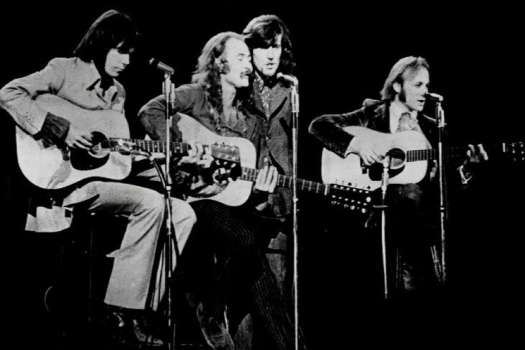If you want to talk about rock'n'roll in myth-making terms, Mercury Rev top the charts. They've done it all. They recorded their debut album in 1989, sneaking studio time during Flaming Lips recording sessions. (Rev guitarist and current front-man Jonathan Donahue was the Lips guitar tech, then a guitarist; Rev bassist Dave Fridmann was producing that Lips album, In A Priest Driven Ambulance.) But Mercury Rev's debut, Yerself Is Steam, wasn't released until 1991 after their label, Rough Trade, went under. Their then singer David Baker fought continuously with his other band-mates (rounded out by guitarist Grasshopper), including leaving the stage during performances to drink and heckle from the audience he left the band by mutual agreement before 1995's transitional album See You On the Other Side. That same year, Fridmann decided to stop touring with the band in order to concentrate on producing; he currently runs Tarbox Road Studios in upstate New York. Drug and alcohol abuse has been a constant contributor to turmoil, including the entire band being banned from air travel after Donahue tried to gouge out Grasshopper's eye with a fork mid-flight. The list goes on: they were thrown off Lollapalooza for excessive noise and their soundman was reportedly removed in a headlock by security; Grasshopper spent time in a monastery; and Donahue had a breakdown severe enough that he contemplated suicide.
But then came the album that Donahue figured was the end of the band. "See You On the Other Side was a record that we'd worked on and we felt had some really beautiful moments on it, and nobody bought it. Nobody played it. Nobody wrote about it. So it didn't look good for ol' Mercury Rev. We made this funny little record, Deserter's Songs, and it looked like that was going to be it for us."
Far from the end, Deserter's Songs proved to be the wrench in Mercury Rev's apparent destiny to be a little-known, critically legendary band that imploded before their true worth could be appreciated. Instead it was hailed around the world as a masterpiece, selling five or six times what any previous record had. And it belied another rock'n'roll myth that the music's roots are in youth. Very much like their musical soul-mates, compatriots and fellow travellers through the musical underground the Flaming Lips, Mercury Rev was actually getting better as they got older.
Now after two years on the road supporting Deserter's around the world, three weeks off, and another year spent in the studio, Mercury Rev has emerged with a stunning new album, All Is Dream, a healthy outlook and perhaps most valuable, a sense of perspective. "These days we carry ourselves in a different way," says Donahue, who speaks with the senatorial tones of a serious newscaster. "We have a greater library of experience to pull from when situations get tense, as it were. In the early years, we blew up, we imploded. It was too small a space for the personalities that were there. But communication between the band heading into All Is Dream was higher than it had been since our first album."
Strangely enough, Donahue attributes their success to the magnitude of the obstacles that faced them. "It had to do with the desperation we felt," he says. "We always felt that we were making some special music. Did everyone else? At times, yes, at times, certainly not. By the time Deserter's came out, we had already been to the bottom. We knew what it was like to show up at a club and no one is there. We're a stronger band, personally, because of the lower experiences' let's call them. When the shows started selling out and the halls became huge, we didn't think My god, we are the gods people say we are' because we'd had those other experiences. We learned to say Thank you for showing up tonight' because we know what it's like when you don't, and how hard it is to get anyone excited to go and see music these days. It's an appreciation, rather than an arrogance."
The new album is another step in what has become the band's evolution since Baker departed before See You On the Other Side a more dramatic, drifting, layered sound that eschews the random bursts of noise that populated Yerself Is Steam or 1993's Boces. It's part of a sound that Fridmann is developing from behind the boards at Tarbox Road Studios as well. From Fridmann's perspective, current Mercury Rev material is more experimental, simply because the band is better than they were. "I don't think we were capable of experimenting before," he writes by email. "In the past, it was simply a matter of survival. Now that we can control what we are doing, we can purposely experiment."
That journey includes new explorations in sound, instrumentation and mood, but also incorporates greater, more ethereal considerations, like listening to what the song is telling you. "I don't mean to be vague about it," Donahue says tentatively, "but for us it works better when we communicate mentally, more than when we have to sit down and speak in words: Here's what I want, here's what I'm thinking, here are the lyrics, look how deep they are.' We don't just write songs in the studio, we have them built up in our minds. [Drummer] Jeff [Mercel] might come in with a piano progression; two days of hearing that, I'll say Well, I've got these words and they seem to work but I don't know why.'"
This instinctive, amorphous process continues right through the recording process, which like the Lips, is notoriously time-consuming. "When we were younger, I don't think we listened as closely to the songs and what they were telling us as we should have, but I simply chalk that up to youth," Donahue explains. "When we're in the middle of recording, eventually the song starts speaking up for itself, saying This isn't working. You've gone to far. I don't need all this stuff on me.' We'll begin erasing. With other songs, it will say You haven't paid enough attention to me, I'm needing something else here' and we'll start messing around until we find what that is. Do the songs speak in English? No. They use symbols, they use colours how attentive we are to that symbolism is how quickly we can get a song to its fruition."
Dave Fridmann may be the genius sonic architect behind Mercury Rev's brilliant recordings, but there's no doubt that Jonathan Donahue has taken the reigns as the band's leader. And appropriately, it is he who embraces one final rock'n'roll cliché as the band begins again the cycle of touring and promotion that his life was saved by rock'n'roll.
"With every album, well received or not, I gave everything I had. I try to never regret anything. Of course, there are ways that I've treated people and people have treated me that were very poor very poor judgements on my part and theirs. That was one aspect of me then, this is me now, and I hope you'll find this a better aspect of me than you did four or five years ago. What makes me happy is writing in Mercury Rev. When I go home, I buy as much time as I can for myself and then I write, because it's in me and it has to come out. If it doesn't, that's when I become a miserable son of a bitch."
Dave Fridmann's Tarbox Road Studios
"Tarbox Road was born out of necessity in 1997," writes Fridmann. "I was tired of always travelling away from my family to work, and we needed to find a studio to create the Flaming Lips' [four disc simultaneous-play sound experiment] Zaireeka. We found a suitable location in the middle of nowhere [in upstate New York] and a studio was born. Tarbox is a very high tech place where you don't have to get out of your pajamas to go to work." In addition to the Flaming Lips ("What can I say," Fridmann enthuses, "the best") and Mercury Rev, who set up camp for months at a time to write and record, many others have made the pilgrimage for Fridmann's hospitality and producing skill.
 Mogwai Come On Die Young; Rock Action (Matador, 1999; 2001)
Mogwai Come On Die Young; Rock Action (Matador, 1999; 2001)
These Scottish cosmic post-rockers are, according to Fridmann, "the most organised and dedicated bunch of drunken lunatics that I know. When working on [Come On Die Young track] Cody' they would do these huge long freak-outs and I would sit there thinking This is amazing.' They would finish and in unison say Shite!' When we did it again, all the best bits would still be there and all the bad bits would be gone. I didn't realise how well rehearsed they were."
 Weezer Pinkerton (Geffen, 1996)
Weezer Pinkerton (Geffen, 1996)
Fridmann co-engineered this darker, messier sophomore effort from these crunchy power poppers. "These guys are a great band and Pinkerton is an amazing record. Rivers [Cuomo] really poured his heart out. I had to ask him a couple of times, Do you really want to let people know that about you?' He was resolute."
 Wheat Hope and Adams (Sugar Free, 1999)
Wheat Hope and Adams (Sugar Free, 1999)
Dreamy shoegazers Wheat came into their own with this underrated gem. "It's weird when things just go really right. It felt so easy to make Hope and Adams. We had serious time constraints, but it never felt as though we couldn't finish it the right way. They have such an amazing positive and interesting feel to everything that they do. I can't wait for people to hear the new record."
 Bodega Without A Plan (Booboo, 2001)
Bodega Without A Plan (Booboo, 2001)
Toronto popster Andrew Rodriguez finally emerges with a new album. "Bodegamusic.com if you want a blast of great songs," writes Fridmann. "Andrew has an amazing guitar tone. All his gear was on the edge of total destruction, but I think we got it to tape. These guys are the fiercest badminton players around."
 Elf Power A Dream In Sound (Arena Rock, 1999)
Elf Power A Dream In Sound (Arena Rock, 1999)
Elephant 6 home-recording mavens make the leap to a bigger sound and create the best album of their career. "I know it was really scary for them to jump from the four-track to the big' studio, but I think we made a beautiful record."
 Home XIV (Arena Rock, 1999)
Home XIV (Arena Rock, 1999)
New York-based psychedelic kin to the Lips and Mercury Rev, Home reached their peak with this 14th release. "I had been trying to get together with these guys for about two years when I finally did. They are nuts. We only had two weeks to make XIV. Fortunately, my assistant Michael Ivins disdains sleep and continued to engineer after I went home at night. They are super creative and had a total master plan for the record before they arrived. They are on the front line of American prog rock."
But then came the album that Donahue figured was the end of the band. "See You On the Other Side was a record that we'd worked on and we felt had some really beautiful moments on it, and nobody bought it. Nobody played it. Nobody wrote about it. So it didn't look good for ol' Mercury Rev. We made this funny little record, Deserter's Songs, and it looked like that was going to be it for us."
Far from the end, Deserter's Songs proved to be the wrench in Mercury Rev's apparent destiny to be a little-known, critically legendary band that imploded before their true worth could be appreciated. Instead it was hailed around the world as a masterpiece, selling five or six times what any previous record had. And it belied another rock'n'roll myth that the music's roots are in youth. Very much like their musical soul-mates, compatriots and fellow travellers through the musical underground the Flaming Lips, Mercury Rev was actually getting better as they got older.
Now after two years on the road supporting Deserter's around the world, three weeks off, and another year spent in the studio, Mercury Rev has emerged with a stunning new album, All Is Dream, a healthy outlook and perhaps most valuable, a sense of perspective. "These days we carry ourselves in a different way," says Donahue, who speaks with the senatorial tones of a serious newscaster. "We have a greater library of experience to pull from when situations get tense, as it were. In the early years, we blew up, we imploded. It was too small a space for the personalities that were there. But communication between the band heading into All Is Dream was higher than it had been since our first album."
Strangely enough, Donahue attributes their success to the magnitude of the obstacles that faced them. "It had to do with the desperation we felt," he says. "We always felt that we were making some special music. Did everyone else? At times, yes, at times, certainly not. By the time Deserter's came out, we had already been to the bottom. We knew what it was like to show up at a club and no one is there. We're a stronger band, personally, because of the lower experiences' let's call them. When the shows started selling out and the halls became huge, we didn't think My god, we are the gods people say we are' because we'd had those other experiences. We learned to say Thank you for showing up tonight' because we know what it's like when you don't, and how hard it is to get anyone excited to go and see music these days. It's an appreciation, rather than an arrogance."
The new album is another step in what has become the band's evolution since Baker departed before See You On the Other Side a more dramatic, drifting, layered sound that eschews the random bursts of noise that populated Yerself Is Steam or 1993's Boces. It's part of a sound that Fridmann is developing from behind the boards at Tarbox Road Studios as well. From Fridmann's perspective, current Mercury Rev material is more experimental, simply because the band is better than they were. "I don't think we were capable of experimenting before," he writes by email. "In the past, it was simply a matter of survival. Now that we can control what we are doing, we can purposely experiment."
That journey includes new explorations in sound, instrumentation and mood, but also incorporates greater, more ethereal considerations, like listening to what the song is telling you. "I don't mean to be vague about it," Donahue says tentatively, "but for us it works better when we communicate mentally, more than when we have to sit down and speak in words: Here's what I want, here's what I'm thinking, here are the lyrics, look how deep they are.' We don't just write songs in the studio, we have them built up in our minds. [Drummer] Jeff [Mercel] might come in with a piano progression; two days of hearing that, I'll say Well, I've got these words and they seem to work but I don't know why.'"
This instinctive, amorphous process continues right through the recording process, which like the Lips, is notoriously time-consuming. "When we were younger, I don't think we listened as closely to the songs and what they were telling us as we should have, but I simply chalk that up to youth," Donahue explains. "When we're in the middle of recording, eventually the song starts speaking up for itself, saying This isn't working. You've gone to far. I don't need all this stuff on me.' We'll begin erasing. With other songs, it will say You haven't paid enough attention to me, I'm needing something else here' and we'll start messing around until we find what that is. Do the songs speak in English? No. They use symbols, they use colours how attentive we are to that symbolism is how quickly we can get a song to its fruition."
Dave Fridmann may be the genius sonic architect behind Mercury Rev's brilliant recordings, but there's no doubt that Jonathan Donahue has taken the reigns as the band's leader. And appropriately, it is he who embraces one final rock'n'roll cliché as the band begins again the cycle of touring and promotion that his life was saved by rock'n'roll.
"With every album, well received or not, I gave everything I had. I try to never regret anything. Of course, there are ways that I've treated people and people have treated me that were very poor very poor judgements on my part and theirs. That was one aspect of me then, this is me now, and I hope you'll find this a better aspect of me than you did four or five years ago. What makes me happy is writing in Mercury Rev. When I go home, I buy as much time as I can for myself and then I write, because it's in me and it has to come out. If it doesn't, that's when I become a miserable son of a bitch."
Dave Fridmann's Tarbox Road Studios
"Tarbox Road was born out of necessity in 1997," writes Fridmann. "I was tired of always travelling away from my family to work, and we needed to find a studio to create the Flaming Lips' [four disc simultaneous-play sound experiment] Zaireeka. We found a suitable location in the middle of nowhere [in upstate New York] and a studio was born. Tarbox is a very high tech place where you don't have to get out of your pajamas to go to work." In addition to the Flaming Lips ("What can I say," Fridmann enthuses, "the best") and Mercury Rev, who set up camp for months at a time to write and record, many others have made the pilgrimage for Fridmann's hospitality and producing skill.
 Mogwai Come On Die Young; Rock Action (Matador, 1999; 2001)
Mogwai Come On Die Young; Rock Action (Matador, 1999; 2001)These Scottish cosmic post-rockers are, according to Fridmann, "the most organised and dedicated bunch of drunken lunatics that I know. When working on [Come On Die Young track] Cody' they would do these huge long freak-outs and I would sit there thinking This is amazing.' They would finish and in unison say Shite!' When we did it again, all the best bits would still be there and all the bad bits would be gone. I didn't realise how well rehearsed they were."
 Weezer Pinkerton (Geffen, 1996)
Weezer Pinkerton (Geffen, 1996)Fridmann co-engineered this darker, messier sophomore effort from these crunchy power poppers. "These guys are a great band and Pinkerton is an amazing record. Rivers [Cuomo] really poured his heart out. I had to ask him a couple of times, Do you really want to let people know that about you?' He was resolute."
 Wheat Hope and Adams (Sugar Free, 1999)
Wheat Hope and Adams (Sugar Free, 1999)Dreamy shoegazers Wheat came into their own with this underrated gem. "It's weird when things just go really right. It felt so easy to make Hope and Adams. We had serious time constraints, but it never felt as though we couldn't finish it the right way. They have such an amazing positive and interesting feel to everything that they do. I can't wait for people to hear the new record."
 Bodega Without A Plan (Booboo, 2001)
Bodega Without A Plan (Booboo, 2001)Toronto popster Andrew Rodriguez finally emerges with a new album. "Bodegamusic.com if you want a blast of great songs," writes Fridmann. "Andrew has an amazing guitar tone. All his gear was on the edge of total destruction, but I think we got it to tape. These guys are the fiercest badminton players around."
 Elf Power A Dream In Sound (Arena Rock, 1999)
Elf Power A Dream In Sound (Arena Rock, 1999)Elephant 6 home-recording mavens make the leap to a bigger sound and create the best album of their career. "I know it was really scary for them to jump from the four-track to the big' studio, but I think we made a beautiful record."
 Home XIV (Arena Rock, 1999)
Home XIV (Arena Rock, 1999)New York-based psychedelic kin to the Lips and Mercury Rev, Home reached their peak with this 14th release. "I had been trying to get together with these guys for about two years when I finally did. They are nuts. We only had two weeks to make XIV. Fortunately, my assistant Michael Ivins disdains sleep and continued to engineer after I went home at night. They are super creative and had a total master plan for the record before they arrived. They are on the front line of American prog rock."




